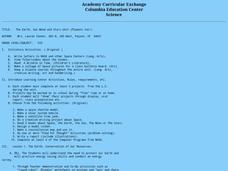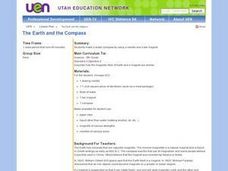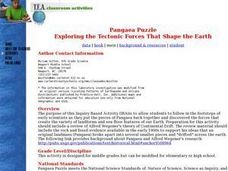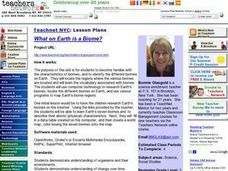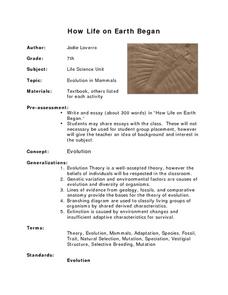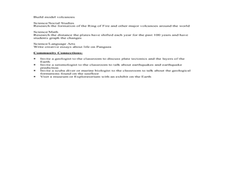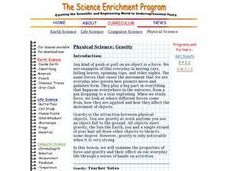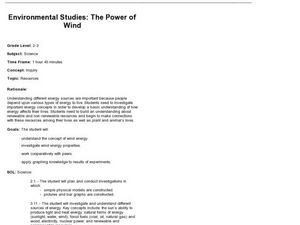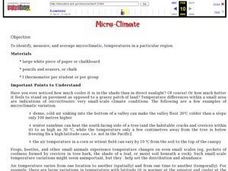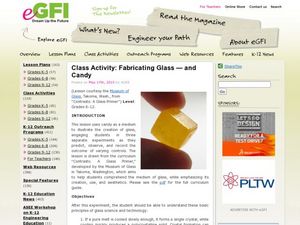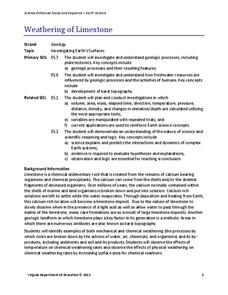Curated OER
What's Down There?
Investigate the coral reefs around Mokolai Island, Hawaii by researching and writing about improving the reef ecosystem. Students map threats to the ecosystem and use the list of key words to assist in their descriptions
STEM for Teachers
Tsunami!
How does the depth of an ocean affect the speed of a tsunami's waves? Use Jell-o, graham crackers, and marshmallows to model the effects of an underwater earthquake and its resulting tsunami. The lesson includes hands-on activities,...
Curated OER
Fostering Geospatial Thinking: Space to Earth: Earth to Space (SEES)
High schoolers locate and access data to help them with their science inquiry. In this geographical positioning lesson students evaluate and compare data sets.
Curated OER
The Earth, Sun, Moon, And Stars
Fifth graders explore the solar system. In this solar system unit, 5th graders investigate numerous projects while rotating through learning centers. Students write about space and construct a space shuttle model. Students practice map...
Curated OER
The Earth and the Compass
Fifth graders construct a water compass to investigate the effects of Earth's magnetic field and other sources of magnetism. They predict, observe and draw conclusions from their investigation.
Curated OER
Pangaea Puzzle: Exploring the Tectonic Forces That Shape the Earth
Sixth graders follow in the footsteps of early scientists as they put the pieces of Pangaea back together and discovered the forces that create the variety of landforms and sea-floor features of our Earth.
Curated OER
Moving the Earth
Fifth graders simulate the three primary types of fault movement lateral fault, reverse fault, and normal fault by positioning their hands and applying pressure to them to observe the similar action taking place in the Earth's crust.
Curated OER
What on Earth is a Biome?
Students explore organisms and their environments. They examine change over time
demonstrate an understanding of physical positions on Earth. They survey earth's diversity, write a report, fill in a data table created on the...
Curated OER
How Life on Earth Began
Seventh graders investigate the concept of evolution and how it was a mechanism for the foundation of life on Earth. They conduct research and attempt to make cognitive connections with the evidence to agree with the presupposition of...
Curated OER
Glacial Striation Investigation
Students operate a GPS unit to investigate the direction of glacier movement. They describe the motion of glacier movement by interpreting a graph. Students explain how scientists use glacier striations to determine glacier movement.
Curated OER
Earth's Ecology
Learners investigate the three states of water. In this physical science lesson, students watch the video "Earth's Ecology" and observe water in its' three states. Learners record observations.
Curated OER
Three R's to Environmental Stewardship: Earth Day
Students explore the ways to conserve our natural resources. In this recycling, reusing, and reducing lesson students read Dinosaurs to the Rescue and apply their findings to learning ways to conserve resources. Students complete a...
Curated OER
Under My Feet
Fifth graders investigate the layers of the Earth, origin of tectonic plates and what happens when plates collide. They watch a video and use clay to demonstrate the different types of plate movement.
Curated OER
How Hot is that Star?: Astronomy, Sun, Solar Temperature, Science
Students explain sun facts and solar information. They discover how temperature of a star is measured. They investigate the various scales used to measure temperature. They observe images of the sun. They classify stars according to te
Curated OER
Physical Science: Gravity
Learners investigate the properties of force and gravity and their effects on everyday life. In groups, they test various balls by bouncing them on different surfaces and observe the properties. In another activity, they test marbles and...
Curated OER
Tsunami! Examining Earth's Most Destructive Waves
Students investigate just what a tsunami is, what causes it, how fast it travels, what it looks like, and its devastating effects upon landfall. They read the experience of a former Peace Corps Volunteer who went to Sri Lanka after it...
Curated OER
Day And Night: Interdisciplinary Study of Cyclic Change
Eighth graders conduct a "Length of Day Symposium." They complete a variety of activities and explorations regarding the earth's rotation, its revolution around the sun and the cyclic changes in climate and energy distribution on the...
Curated OER
Environmental Studies: The Power of Wind
Investigate the prospect of wind as a renewable resource. Second and third graders make a pinwheel, answer critical thinking questions, and then attempt to use wind power to wind string. I would be more apt to use this lesson in a 1st or...
Curated OER
Micro-Climate
Atmosphere aces investigate the microclimates that exist within a larger area. They use a thermometer to record the varying temperatures and identify the microclimates on a map that they have drawn. This exercise helps them to understand...
eGFI
Fabricating Glass and Candy
What factors affect the creation of glass? Youngsters work with sugar crystals as a simulation of glass-making. First, they melt some crystals, then they add water and stirring action as a modifier, they melt sugar in water without...
Curated OER
Storm Clouds-- Fly over a Late Winter Storm onboard a NASA Earth Observing Satellite
Students study cloud data and weather maps to explore cloud activity. In this cloud data lesson students locate latitude and longitude coordinates and determine cloud cover percentages.
Virginia Department of Education
Weathering of Limestone
We all know limestone weathers, but what affects the rate of weathering? Young scientists investigate the physical and chemical weathering of limestone (chalk) through experimentation. First, they conduct trials with different-size...
Virginia Department of Education
The Hydrologic Cycle
There is the same amount of water on earth now as there was when it was formed. The water from your faucet could contain molecules that dinosaurs drank! Young scientists build their own hydrologic cycle model and observe it for five...
Wild BC
The Greenhouse Effect: Warming the Earth Experiment
First in a two-part lesson on the greenhouse effect, this lesson involves a classroom demonstration of the phenomenon, and a lab group experiment with color and absorption. Although there are easier ways to demonstrate the greenhouse...





